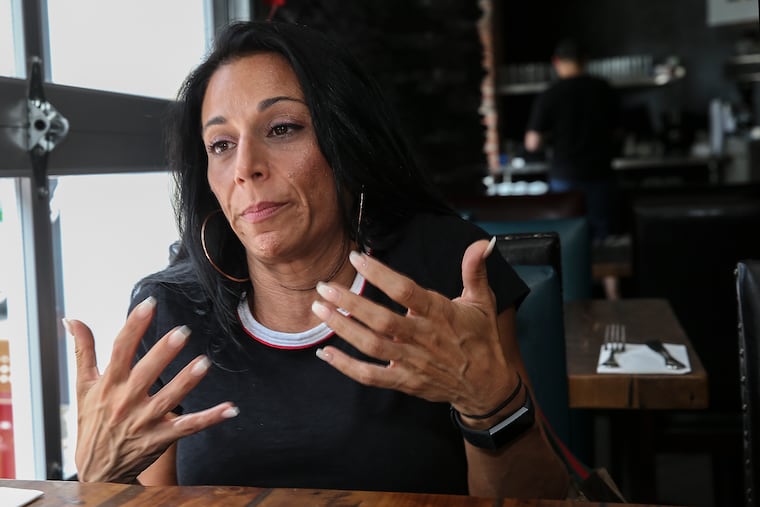‘We ceased living’ after her 16-year-old son died in a South Philly double homicide | Helen Ubiñas
“Nothing that happens in your life goes without a thought of the child who is no longer here," Samantha DiNubile says.

Inside a new South Philadelphia restaurant, a mother speaks of the day she died.
The death certificate for 16-year-old Salvatore DiNubile may have noted Oct. 24, 2017, as the day he took his last breath. But it might as well have included the names of his mother and father and two siblings.
“We ceased living,” the mother says.
I’ve talked to a lot of mothers whose children’s lives were cut short by a bullet. It is always hard, always heartbreaking. But however deep their descent into darkness, there is often a sliver of light they hold onto: someone being held accountable for their child’s murder, grandchildren who remind them of their lost child, memories that are at once painful but welcome.
Something.
There is none of that with Samantha DiNubile, 45. No peace in knowing that the teenager convicted of killing her son alongside another teen, Caleer Miller, was sentenced to 37 years to life that very morning. That in honor of her late brother, her daughter, Ciarra Bianculli, is headed to law school, something that Sal had talked about doing after going to his dream college, Penn State.
She was gracious when I tossed her a life raft that I nearly begged her to take, afraid of the idea that there are some depths from which there may be no coming back: Someday a little of the darkness may lift with college graduations, other children’s weddings, I offered, maybe a grandchild or two, reasons to be happy again that she might not be able to see right now.
“Nothing that happens in your life goes without a thought of the child who is no longer here," she says. “It is a bottomless hole of all-consuming agony and grief.” And, at times, of white-hot rage that spilled over in court.
Only another parent who has experienced this loss would understand, and for that words fail those in this torturous fellowship. She and Caleer Miller’s mother exchanged heart emoji texts after court.
Even at 16, “Tankie,” as they called the husky teen who always seemed larger than any room he was in, was the center of the tight-knit family from 12th and Ritner, one of those South Philly blocks where neighbors are family, where kids come up together from kindergarten, where they are in and out of each others’ lives and homes and refrigerators.
It was a chaotic and crowded existence in their 900-square-foot home, where they all but had to make appointments for the small bathroom.
But she was happy, she says. They were happy.
"Whole.”
And then a bullet pierced their son’s chest.
That morning in court, young men who reminded her of her son read victim-impact statements, kind but torturous reminders of how much they had all lost. Tankie was smart, thoughtful, curious, and charming enough to somehow persuade his maternal grandparents to sell their New Jersey house and move back to South Philly so they could spend more time together. During one of his regular visits shortly before his death, he and his grandfather Pasquale Bianculli had discussed To Kill a Mockingbird, a book he had just finished reading for class at St. Joseph’s Prep. The Count of Monte Cristo was to be next. The grandfather now reads a few pages of the book every time he visits his Sal’s grave.
For a few weeks after the murder, the family stayed in the house that is just steps from where Sal was shot by another teen who police said was looking for trouble when he pulled a gun. In court, he maintained his innocence.
They stayed downstairs, as far away as they could from the room Sal shared with his younger brother, Sonny. They tried not to hear the voices of other kids talking and laughing outside their windows.
Then they moved, and despite offers from her family to help, Samantha packed up Sal’s room alone.
“To see, to touch, to feel … to have him,” she says. She hung some of his favorite clothes in her closet.
“You go from being a mother to three kids, to not having your other child to mother, so you find things to do to include him in your mothering,” she says. “But then you realize that the grief you carry is all-consuming, and you really only wind up being a mother to the child you lost."
In court, her daughter read a letter to the judge. “Grief, although it is exhausting,” her daughter wrote, “is the closest connection we have now with Tankie.”
It’s all she has left, the mother says. “To let that go, it means you let your child go, and I’ll never let my child go.”
The house they moved into is bigger. There’s no longer a wait for the bathroom. And the new restaurant the mother is sitting in is one that her husband and a couple of partners had been working on before their son was killed.
It’s staffed by friends and family to whom she doesn’t have to explain herself or her feelings.
They named the place Tankie’s Tavern.